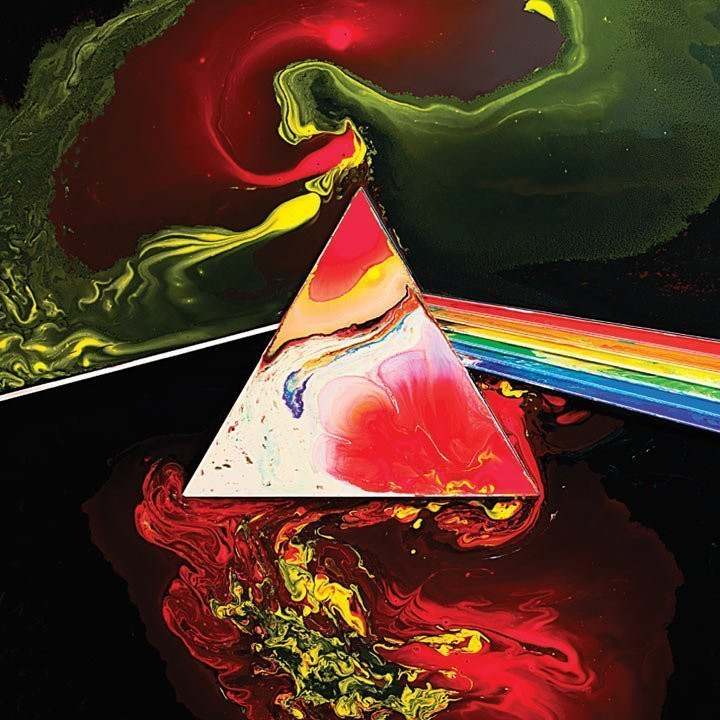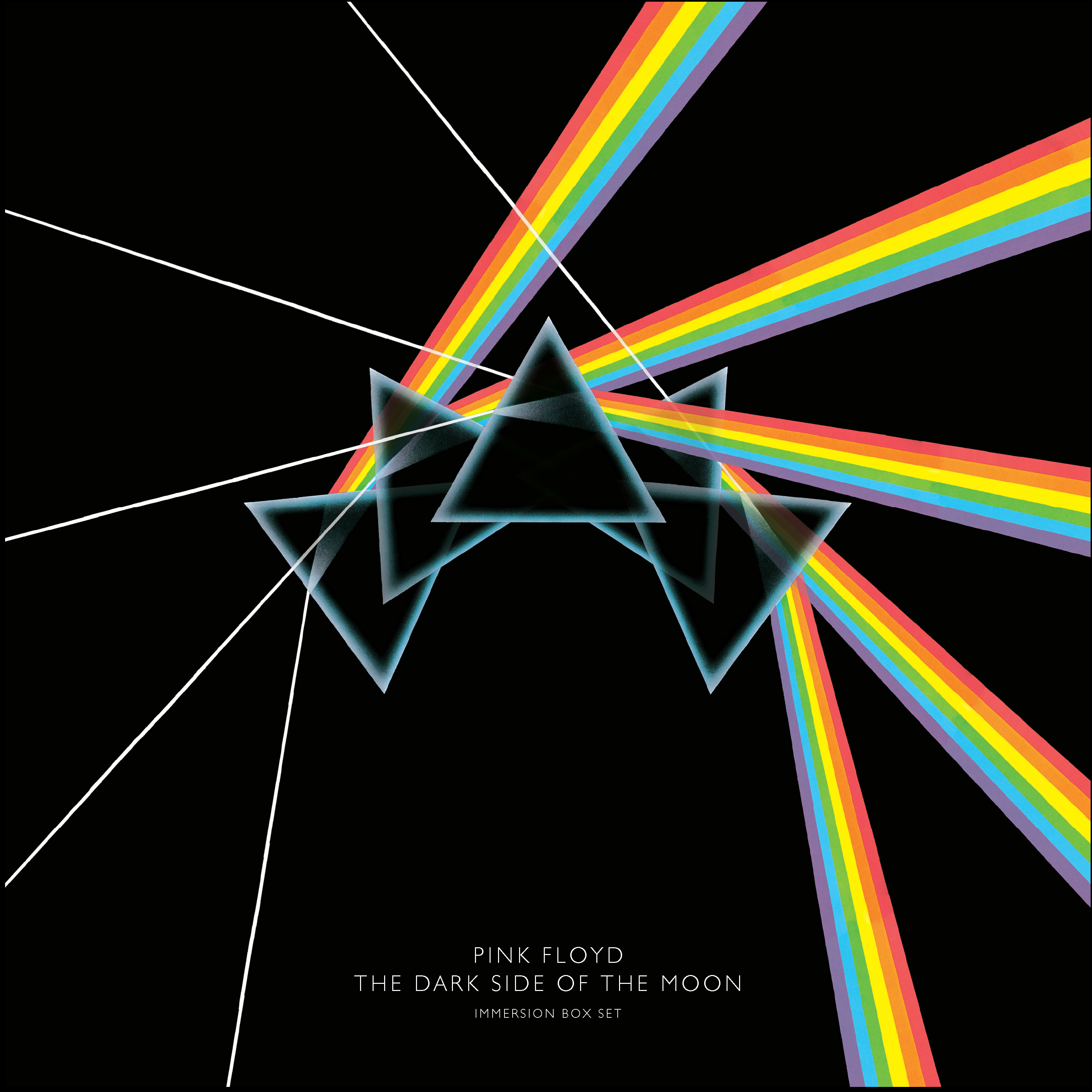Like many 1960s rock bands in the London scene, Pink Floyd set out as a run-of-the-mill rhythm and blues project. The first stable line-up, Syd Barrett, Nick Mason, Roger Waters and Richard Wright, found its footing in live sets consisting primarily of covers. All the while, original bandleader Barrett was preparing to shake the foundations of contemporary rock music with his unique eye for abstract lyricism and colourful composition.
In their debut single, ‘Arnold Layne’, Pink Floyd debuted their psychedelic sound with ethereal vocal harmonies, fuzzy guitar melodies and Wright’s shimmering keyboard work. As they began work on their first album, Pink Floyd started to gain a reputation as a “space rock” group thanks to songs like ‘Interstellar Overdrive’ and ‘Astronomy Domine’. Such songs resonated profitably with the concurrent space race, which culminated in the Apollo 11 Moon landings in 1969.
To consolidate their early image as intrepid psychonauts, Pink Floyd created rudimentary light shows using rotating colour slides and domestic light bulbs. “At the launching of the new magazine IT the other night, a pop group called the Pink Floyd played throbbing music while a series of bizarre coloured shapes flashed on a huge screen behind them … apparently very psychedelic,” read a 1967 gig review in the Sunday Times.
After achieving success with The Piper at the Gates of Dawn, Pink Floyd entered a long period of sonic transition. By 1968, the psychedelic wave had begun to lose its intensity, entering latency before re-emerging as progressive rock in the early 1970s. Pink Floyd traced this trajectory following Barrett’s departure and the induction of David Gilmour as a replacement on guitars.
With uneven releases like Ummagumma and Atom Heart Mother, Pink Floyd faltered somewhat with a lack of sonic coherence as they dipped a toe into the 1970s. However, following a promising change of tides in Meddle, they struck a zenith with The Dark Side of the Moon in 1973, which marked the beginning of a prog-rock reign for the remainder of the decade.
Few would disagree that The Dark Side of the Moon was among the 1970s’ most influential releases. Waters devised a compelling concept for the album, which the band orchestrated perfectly, using unprecedented sound effects and production techniques. Pink Floyd continued to impress through the punk wave, offering juxtapositional complexities in Wish You Were Here and Animals. By the time they started work on The Wall, Waters’ final conceptual masterwork for the band, their work at the musical vanguard was all but finished.
Pink Floyd's Jazz Influences
When you think of Pink Floyd, you might envision their instrumental jams, fantastical lyrics, colorful light shows, and other elements of their early psychedelic music. Or perhaps you think of the layered guitars, lush keyboards, sound effects, and thought-provoking lyrics of their later albums. What you might not associate with Pink Floyd is jazz. Yet, throughout their career, Pink Floyd’s music was heavily influenced by jazz.
Roger “Syd” Barrett, Pink Floyd’s original co-founder and primary songwriter, grew up in Cambridge, immersed in classical music, thanks to his father’s passion for it. He discovered jazz on his own through one of his favorite albums, Jimmy Smith’s Back to the Chicken Shack. His nickname, Syd, was inspired by a jazz bassist named Sid “the Beat” Barrett. When Syd moved to London, he delved into jazz albums like Yusef Lateef’s Eastern Sounds and John Coltrane’s self-titled album. Barrett even named his cat ‘Tunji’ after a track on that album. He also explored free jazz through albums like Sun Ra’s The Heliocentric Worlds of Sun Ra, which influenced the long improvisations and fluid tonality of the psychedelic jams he wrote with Pink Floyd.
While Barrett enjoyed listening to jazz, only one member of Pink Floyd had actually played jazz – keyboardist Richard Wright. Wright was the only member with formal music training, having studied composition and music theory at the Eric Gilder School of Music. He taught himself trumpet, saxophone, and guitar, but ultimately focused on the piano. Later, he studied at the London School of Music.
Wright’s formal music training and love of jazz perfectly complemented Barrett’s more experimental inclinations. Together, they listened to modern classical music and musique concrète, such as Karlheinz Stockhausen and John Cage, and incorporated those influences into Pink Floyd’s music.
In 1968, Barrett was replaced by singer and guitarist David Gilmour. Although Gilmour’s background was in rhythm and blues, he quickly picked up on the jazz chords and progressions that Wright infused into Floyd’s music.
A great example of how Gilmour and Wright infused jazz into a simple chord progression can be found in the song “Breathe” from Pink Floyd’s classic album The Dark Side of the Moon. In his latest video, Scott Freiman CultureSonar’s favorite musicologist explores the jazz influence in “Breathe”.
The Beatles and Pink Floyd's Musical Journey
Much like The Beatles, Pink Floyd were a band adorned with ingenuity and musical talent. Following the mental decline of the band’s original creative lead, Syd Barrett, Roger Waters took the reins as the band’s conceptual coordinator. Meanwhile, David Gilmour bathed in the limelight as the band’s lead guitar extraordinaire, offering his unique melodic seasoning to their progressive material.
All the while, it seemed their pianist, synth player, and occasional singer-songwriter, Richard Wright, quietly went about his business as the group’s understated anchor. While Waters and Gilmour dominated the spotlight, Wright offered a steady ship from which to begin their world domination.
Despite only appearing in the songwriting credits of ten of Pink Floyd’s 217 released songs, Wright was a pivotal force behind many of the band’s most memorable moments during his long-lived tenure. Parallels can quite easily be drawn between Wright’s position in Pink Floyd and George Harrison’s in The Beatles.
As a psychedelic outfit emerging from the 1960s, Pink Floyd were eminently inspired by The Beatles’ latter work. After all, 1967’s Sgt. Pepper’s Lonely Hearts Club Band is often considered the first prog-rock album and is regularly cited as the pivotal force behind major prog groups like Genesis and Yes.
While Wright was doubtlessly intrigued by the latter Beatles material that spoke of yellow submarines, marmalade skies, egg men and ten thousand holes in Blackburn, Lancashire, he wasn’t so fussed about the band’s earlier, lovelorn ditties.
In a 1994 interview at his Earl’s Court residence, Wright discussed some of his favourite records as he shuffled through his beastly collection. One of the first he picked out was Music from Big Pink by The Band.
“The centrepiece of this album, ‘The Weight’, is an incredible tune,” Wright opined. “I remember seeing The Band at the Albert Hall in the late ’60s, and in my head, I can virtually hear them singing ‘The Weight’ at that gig even now. The way the song is sung is so emotional I really can hardly describe it. How do you describe an emotional response to music? I could tell you that a piece moves from an E flat major to F sharp or whatever, but that’s not the point at all, is it?”
Continuing, Wright explained how The Band were the first pop group that his ears welcomed with open arms and how, in comparison, acts like The Beatles seemed immature. “The Band were the best thing happening at that time. When I was first in The Floyd, I wasn’t into pop music at all – I was listening to jazz, and when The Beatles released ‘Please Please Me’, I didn’t like it at all. In fact, I thought it was utterly puerile.”
Considering the widespread love for the band, not only in the public sphere but also within his band, with Roger Waters, Nick Mason, and David Gilmour all noted as huge admirers of the group, it is maybe a little surprising that Wright held such disdain for the group. But, in truth, it was what the group represented that seemed to stick in Wright’s throat. ‘Please, Please Me’ may have been flecked with humour and had an undeniably accessible chorus, but it didn’t sit well with Wright’s vision of what a group of musicians should be aiming for.
The keyboardist acted, for a long time, as the group’s artistic ballast. While their heads were turned by the fame of pop music, Wright’s devotion to jazz and ultimate creativity would bleed into their output and allow Pink Floyd to form a new genre of acid rock, and in turn, be a part of the cultural revolution. But that doesn’t mean Wright hated everything on the rock radios of the day.
“There wasn’t much around at the time that excited me, but then I saw The Band,” he continued “, and they were totally different, totally exciting. Like all these recordings, there’s something about this album that touches me emotionally. The music is just lovely, and it makes this a particularly sentimental choice. I must also mention ‘Tears Of Rage’ – a brilliant song.”
The Birth of a Masterpiece: 'The Dark Side of the Moon'
Before their 1973 masterpiece The Dark Side of the Moon, Pink Floyd had struggled to find their feet following the departure of leading light Syd Barrett in 1968. In the Classic Albums documentary about the LP, guitarist David Gilmour would later describe a lot of their music in the years after Barrett’s dismissal as “that psychedelic noodling stuff”.
Well, there was no noodling on The Dark Side of the Moon. Just 43 minutes of painfully reflective and profoundly poignant music, spread across ten tracks and myriad different genres, but singular in its vision. There are stark meditations on the brevity of life, war, capitalism and class divisions, and mental health.
All of which are couched in an expansive but melodic, jazz-tinged form of psychedelia which Barrett would have been the first to appreciate. Bassist Roger Waters was coming into his own as a songwriter, providing some of the most moving lyrics ever penned for rock songs, and guiding the musical direction of the album.
The title certainly fits the mood of the record, which couldn’t get much darker. The darkness isn’t glib or self-absorbed, though. It’s an expression of deep-seated feelings that the band have a visceral need to share with us, and it can’t fail to move us and make us think.
Quite simply, The Dark Side of the Moon was the first provisional title the band could come up with for the album they were making, to describe the ideas they were putting together. The side of the moon which faces away from the sun was the best metaphor they could find for mental illness, which is the overriding theme throughout the album, as exemplified by the songs ‘Speak to Me’, ‘Brain Damage’ and ‘Eclipse’.
In particular, they were thinking of their former bandmate Barrett, whose mental health struggles had forced him out of the band and into reclusion. The etymology of the word “lunacy”, a common synonym for insanity, appealed to the band because it originated in the medieval diagnosis of an intermittent kind of madness that seemed to vary according to the position of the moon.
The album was even subtitled “A Piece for Assorted Lunatics” when the band premiered it live in London’s Rainbow Theatre a year before its release on record. The theme of lunacy would continue to be an overarching subject of Pink Floyd’s music from that point on, especially on their album Wish You Were Here, for which they wrote the song ‘Shine On You Crazy Diamond’ in direct reference to Barrett.
The band would never manage to top The Dark Side of the Moon, though, as a singular piece of art. As Waters recently explained to AXS TV, Floyd had “finally cracked it”. They’d made the album which would define their career.


















